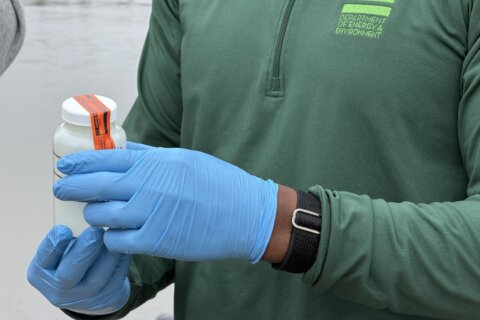WASHINGTON — D.C. health officials will be expanding mosquito surveillance for new types of ailments and will be issuing warnings to prevent the spread of viruses including Zika.
“This year we’ll be doing two outreach events and giving people mosquito prevention kits. Those mosquito prevention kits will contain educational information, personal mosquito repellent, as well as larvicide dunks,” said D.C. Department of Health Director LaQuandra Nesbitt at a Tuesday news conference.
Nesbitt said that growing concerns globally about the spread of mosquito-borne viruses like Zika is prompting local action.
Expanded testing of mosquitoes now will check for the Zika virus, chikungunya and dengue fever in addition to the West Nile virus that’s been included in District surveillance since 2002.
Community outreach meetings will be held in each of the District’s eight wards on Saturday, May 14, and Saturday, July 16.
District officials will apply larvicide to areas of standing water and catch basins to kill mosquito populations and ask that property owners also take preventive steps such as dumping standing water.
Any D.C. resident who would like to receive free mosquito larvicide dunks can contact the Department of Health by emailing doh@dc.gov or calling (202) 442-5955.
There’s been mounting evidence linking the Zika virus in pregnant women to a rare birth defect called microcephaly, in which a newborn’s head is smaller than normal and the brain may not have developed properly. Officials also are investigating a Zika-related increase in reports of a nerve condition called Guillain-Barre that can cause paralysis.
The variety of mosquito that carries Zika virus is rarely found in the metro Washington area, but health officials say people traveling to Zika affected areas should try to prevent spreading it once returning home.
“We know most people don’t exhibit symptoms of Zika, even if they were to be infected,” Nesbitt notes. But, people can spread Zika regardless of evident symptoms if bitten by a mosquito that can carry it.
“So, wearing mosquito repellent for three weeks upon your return helps reduce that likelihood,” Nesbitt adds.
Zika can also be spread sexually.
“If people who travel to affected areas, even if they don’t have symptoms were to use condoms as barrier protection for up to eight weeks after their return, that reduces the likelihood of sexual transmission,” Nesbitt said.
In February, the D.C. Department of Health confirmed three cases of Zika in the District — all of which involved people who contracted it after traveling abroad.
Additional information about the Zika Virus from the Centers for Disease Control and Prevention can be found here.








